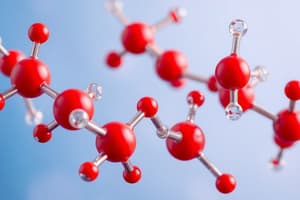Podcast
Questions and Answers
What is the primary function of phospholipids in a cell?
What is the primary function of phospholipids in a cell?
- To synthesize DNA
- To act as hormones in the cell
- To provide energy to the cell
- To make up cell membranes (correct)
Which type of reaction is the reverse of a dehydration reaction?
Which type of reaction is the reverse of a dehydration reaction?
- Condensation
- Fermentation
- Hydrolysis (correct)
- Deamination
What is the term for the process by which monomers are linked together to form a polymer?
What is the term for the process by which monomers are linked together to form a polymer?
- Depolymerization
- Hydrolysis
- Dehydration
- Polymerization (correct)
Which type of reaction involves the formation of a new bond with the removal of water?
Which type of reaction involves the formation of a new bond with the removal of water?
What is the role of enzymes in biological reactions?
What is the role of enzymes in biological reactions?
What is the term for the breakdown of a polymer into its monomers?
What is the term for the breakdown of a polymer into its monomers?
What is the result of a dehydration reaction?
What is the result of a dehydration reaction?
What is the primary function of carbohydrates in a cell?
What is the primary function of carbohydrates in a cell?
Which type of reaction involves the breakdown of a molecule with the addition of water?
Which type of reaction involves the breakdown of a molecule with the addition of water?
What is the term for the process by which water is added to break a bond?
What is the term for the process by which water is added to break a bond?
Flashcards are hidden until you start studying
Study Notes
Polymers and Monomers
- Polymers are large biological molecules composed of smaller molecules called monomers
- Monomers are the building blocks of polymers, and different types of monomers form different classes of polymers
Synthesis of Polymers
- Polymerization is the process of forming polymers from monomers
- This process is facilitated by enzymes, which speed up chemical reactions
- The reaction that connects a monomer to another monomer or a polymer is a condensation reaction
- In a condensation reaction, two molecules are covalently bonded to each other with the loss of a small molecule (dehydration reaction)
- Examples of polymer synthesis include carbohydrate and protein polymers
Breakdown of Polymers
- The breakdown of polymers into monomers is called hydrolysis
- Hydrolysis is the reverse of the dehydration reaction
- A water molecule is added to break the bond between monomers, with a hydrogen from water attaching to one monomer and a hydroxyl group attaching to the other
- Examples of hydrolysis include digestion, where enzymes break down polymers into monomers
Diversity of Macromolecules
- The diversity of macromolecules in the living world is vast and effectively limitless
- This diversity is due to the arrangement of monomers, with the linear sequence of units determining the characteristics of the polymer
- Despite being constructed from a limited number of monomers, the possible variety of polymers is enormous
Studying That Suits You
Use AI to generate personalized quizzes and flashcards to suit your learning preferences.




